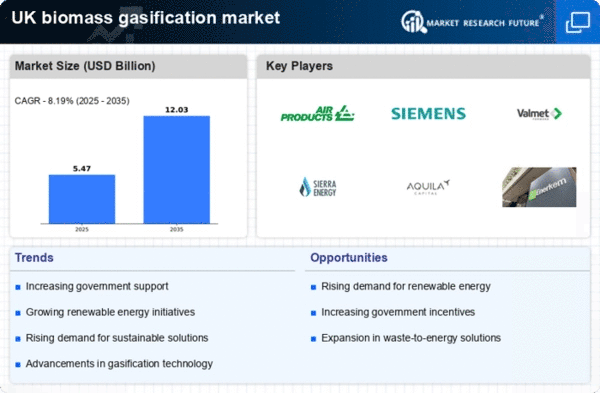Rising Energy Costs
The escalating costs of traditional energy sources in the UK are driving interest in alternative solutions, such as the biomass gasification market. As fossil fuel prices fluctuate, businesses and consumers are increasingly seeking stable and sustainable energy options. The biomass gasification market offers a viable alternative, potentially reducing energy expenses by converting organic materials into syngas. This process not only provides a renewable energy source but also mitigates reliance on imported fuels. The UK government has indicated that transitioning to renewable energy could save the economy up to £10 billion annually by 2030. Consequently, the rising energy costs are likely to propel investments in the biomass gasification market, as stakeholders look for cost-effective and sustainable energy solutions.
Environmental Regulations
The UK has implemented stringent environmental regulations aimed at reducing greenhouse gas emissions and promoting sustainable practices. These regulations are fostering growth in the biomass gasification market, as this technology aligns with the country's environmental goals. The UK government has set a target to achieve net-zero emissions by 2050, which necessitates a shift towards cleaner energy sources. Biomass gasification, which converts organic waste into energy while minimizing emissions, is seen as a crucial component in this transition. The market is expected to benefit from increased compliance costs associated with traditional energy sources, making biomass gasification a more attractive option for businesses seeking to adhere to environmental standards. This regulatory landscape is likely to stimulate innovation and investment in the biomass gasification market.
Technological Innovations
Advancements in technology are playing a pivotal role in enhancing the efficiency and viability of the biomass gasification market. Innovations such as improved gasification processes and better feedstock management are making it easier to convert biomass into energy. For instance, the development of advanced gasifiers has increased the conversion efficiency to over 90%, making biomass a more competitive energy source. Furthermore, the integration of digital technologies, such as IoT and AI, is optimizing operations and reducing costs. The UK government has recognized the importance of these technological advancements and is investing in research and development initiatives. This focus on innovation is likely to drive growth in the biomass gasification market, as stakeholders seek to leverage new technologies to improve energy production and sustainability.
Public Awareness and Acceptance
There is a growing public awareness regarding the importance of sustainable energy solutions in the UK. As consumers become more informed about the environmental impacts of traditional energy sources, there is an increasing acceptance of biomass gasification as a viable alternative. Educational campaigns and community engagement initiatives are helping to demystify biomass technologies, leading to greater support for projects that utilize this method. The biomass gasification market stands to benefit from this shift in public perception, as more individuals and businesses advocate for renewable energy solutions. This trend is likely to encourage local governments and private investors to support biomass projects, further driving the market's growth. The increasing public acceptance of biomass gasification could lead to a more robust market presence in the coming years.
Investment in Renewable Infrastructure
The UK is witnessing a surge in investments aimed at developing renewable energy infrastructure, which is significantly impacting the biomass gasification market. The government has committed to funding various renewable energy projects, with a focus on enhancing energy security and reducing carbon footprints. In 2025, the UK government allocated £1.5 billion to support renewable energy initiatives, including biomass gasification. This financial backing is expected to stimulate growth in the market, as it encourages the establishment of new facilities and the upgrading of existing ones. Additionally, private sector investments are also on the rise, as companies recognize the long-term benefits of transitioning to renewable energy sources. This influx of capital is likely to enhance the biomass gasification market's capacity and technological capabilities, positioning it as a key player in the UK's energy landscape.
















